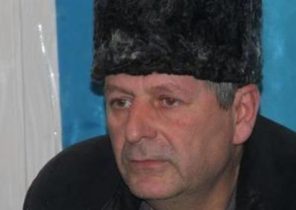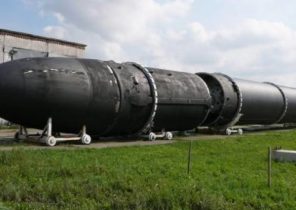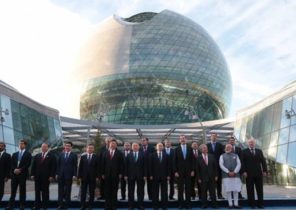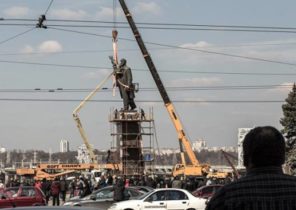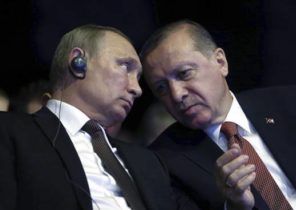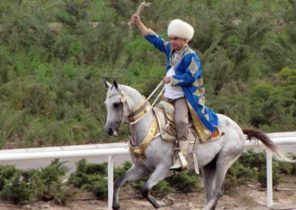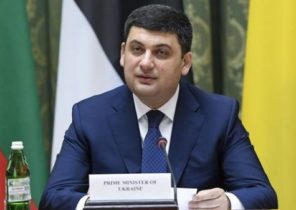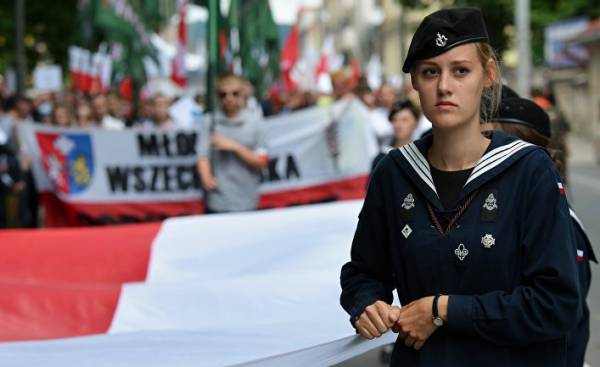
“If Ukraine wants to join the family of European Nations, she must face the truth and deal with its complex history. With the nationalists and Bandera on the banners in the EU it does not enter,” said Deputy defense Minister Michal dworczyk (Michał Dworczyk) in the national day of remembrance of the victims of the genocide of poles committed by Ukrainian nationalists. In a similar tone expressed also many other politicians. The media recalled that at the pre – and postwar Poland killed more than 100 thousand of our compatriots. This tragedy is still an open wound.
Put bluntly: we have missed several opportunities to persuade Ukraine to settle with its past. First appeared during the so-called orange revolution, the second during the crisis and the events on the Maidan, the third — when Russia seized Crimea.
Guided by the highest motives, every time we stood by the wall for our Eastern neighbours and the world’s first recognized independent Ukrainian state. In addition, we have the self-proclaimed “advocate” of Kiev in its desire to integrate with Western structures. Such a position is practically not influenced by the desire of Ukrainians to make a collective act of repentance. And that too should be taken into account, the farther the harder it will be to persuade them to reconsider their attitude to the perpetrators of the crimes seventy years ago, having turned into “national heroes”, which elevate on pedestals and perpetuate the names of streets, squares, schools and other facilities.
The delegation of Ukraine not by chance was among the participants of the summit “Initiative of the three seas” in Warsaw, whose value increased the visit of U.S. President Donald trump. It did not escape the attention of an experienced political commentators, in particular, Taganskogo Jerzy (Jerzy Tarchalski) and Peter Zaremba (Piotr Zaremba). The first spoke on this subject in an interview with Fronda, the second — on the pages wPolityce. pl. Targalski warned that “anti-Ukrainian policy that wants to promote the part of politicians of the party “law and Justice” is suicide and a recipe for disaster”. He explained that you need to consider other important circumstances, namely, different approaches of Central European countries to Russia, which does not always coincide with the Polish position. Peter Zaremba, sharing some ideas Taganskogo emphasizes, however, that “debate on the topic of history is of great importance, and Poland cannot in symbolic terms, to “forgive” Ukraine Volyn”. However, he questions the boundaries of this “unforgiveness”.
At the forefront is geopolitics. Poland is interested in Ukraine was strong, rich and independent from Moscow. Especially that “the Initiative of the three seas” is still a fragile formation, and it is difficult to say what will happen. The reaction of Hungary, Slovakia, Bulgaria or Austria, some of Russia’s actions (especially energy policy) gives rise to a natural question of how Warsaw can rely on eleven countries lying in the space between the Baltic, Adriatic and Black seas?
I believe that a strong Union will not be here, but may appear to the joint economic and infrastructure initiatives that will allow the States in our region get closer to the standard of living of Western Europe. And this is a lot. How this is all from the Polish point of view fits into the Ukraine? Unfortunately, our policy in this direction there is a clear division of those who, in spite of existing problems, support the desire of Ukrainians to integrate with the West (EU and NATO), and “biased”, that is, those who focused on the theme of Ukrainian crimes of the past. The problem is that there is truth in the words first and second.
I do not share the opinion of Jerzy Targalski that “to form in our region, the economic community of Ukraine is impossible without”. It is possible, as seen in the example of how European countries have managed to overcome many long-standing differences. Of course, Ukraine would be better, the only question is whether the interest in the rapprochement between Ukrainians themselves. If so, will be the last opportunity to deal with the painful episodes of our collective history. I say “last” because, as shown, for example, our conflict with Lithuania about the spelling of Polish names, then it will only be more difficult. Solve problems with Russia and, if anything, to get her to go on some concessions, too, was only when she was weak and fragmented. Now, when she matured, make it much harder, if not impossible.
Our attention seemingly slipping away the fact that we continue to border with Russia, with its Krolevetsky area (I don’t understand why we usually use the Russian name Kaliningrad), not to mention the fact that in Belarus growing Russian military base. There is another important aspect. What is the guarantee that in a few years Kiev will not unfold in the direction of Moscow? Now it is difficult to imagine, but sooner or later they will again come together, it is difficult to deny that they are United by centuries-old cultural ties. In Ukraine, in the era of the baptism of Kievan Rus by Prince Vladimir in 988, takes in particular, the origins of the history of the Russian Orthodox Church.
In a historical context we should not forget also about long relations of Ukraine with Germany. Today’s hero of Ukraine, one of the founders of the OUN and UPA (banned in the Russian organizations — approx. ed.), war criminal Stepan Bandera was a collaborator after the war he found refuge in Munich, where in 1959, he was shot by KGB agents.
Now the Kiev government, as it seems, feels more of a connection with Berlin than to Warsaw… How will the events develop, will show time. Eastern proverb says: “hope for the best, prepare for the worst”. As recently announced, the new head of mission of Ukraine to NATO Vadim pristayko said that his country was going to take in the Alliance’s efforts to get an invitation to action Plan on membership.
At the same time from Ukraine comes to warning signals, in particular, the performances of the population against the construction of a Catholic Cathedral in Cherkasy. Before, a similar situation arose in Kiev, where for this reason the construction of the Cathedral was not able to begin until now. Last Monday at the Polish Consulate in Lutsk again exploded firecracker. Three months ago, “unidentified attackers” fired at the building from a grenade launcher.
We assume that this was still not caught by “Russian provocateurs” who seek to “escalate the Polish-Ukrainian relations”. The question of how Ukraine itself is interested in the normalization of relations with our country, remains however open.
It sounds like a mockery, but Ukraine became the heroes of the people involved in the genocide, while Ukrainians, who sometimes gave their lives to save their Polish neighbours, remain in the shadows. I’m all in favour of Polish-Ukrainian reconciliation, but the topic of the brutal murder of thousands of poles killed only because of their nationality, no concessions can not be.
